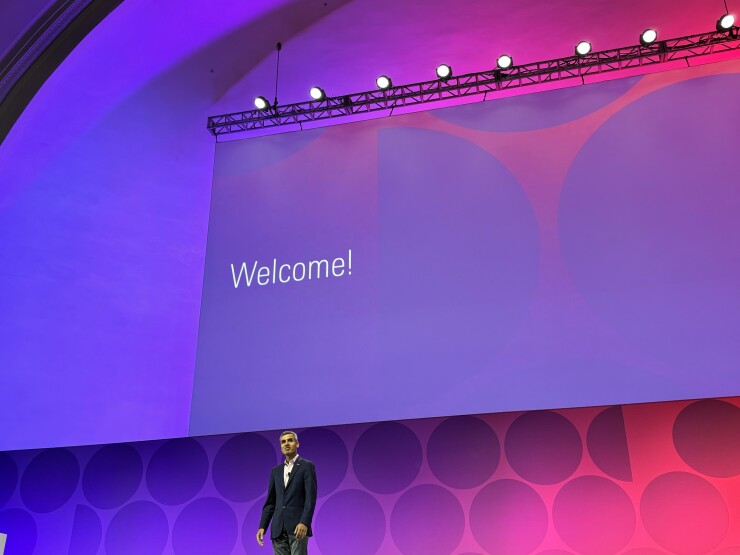Financial advisors and the wealth management industry "benefitted from serious tailwinds" that came on top of "what has been an amazing decade" for stocks, Kunal Kapoor said.
In remarks at investment research, management and technology firm Morningstar's
The mixed positive and negative signals
"If you're in a world of 5% returns, the 100 basis-point fee is 20% of that return, and you can be sure it's going to draw a lot more scrutiny and interest," Kapoor said at the conference, which attracted 2,050 attendees, including 520 advisors. "It's fair for you to say, 'Are we crying wolf again?' But let me assure you: The wolf shows up eventually. It's often, though, when we least expect it."
READ MORE:

Levine on tax planning
Fresh off the
"It's the biggest differential between what advisors are offering and what clients are demanding," he said. "It represents both risk and opportunity."
The potential challenge stems from the fact that many advisors and firms haven't embraced
"You can make all the right decisions for the client and it could still feel like a bad year for the client," Levine said. "Tax planning creates immediately demonstrable value."
In his talk, Levine shared 10 principles of tax planning for advisors:
- "Tax bracket and tax rate are not the same thing";
- "there is no such thing as permanent";
- "the score at halftime matters";
- "lowest lifetime tax bill wins";
- "tax diversification is a useful byproduct but not a goal";
- "don't 'die' on the hill";
- "timing is almost everything";
- "creating basis beats not paying taxes";
- "if it's not reported correctly…it didn't happen"; and
- "advisors can engage in tax planning."
In Levine's opinion, "for far too long, far too many of us" have hid behind the compliance requirement that advisors state they aren't providing tax or legal advice to clients. They can simply switch out "any other word" and plow ahead because advisors are doing tax planning "even if you say you don't," he said.
"We can do tax planning. We can give tax information. We can provide tax education. We can provide tax guidance," Levine said. "We do tax planning each and every day with our clients; it's just a matter of whether we do it consciously or not."
READ MORE:

Kitces on the changes wrought by technology
The presentation by his Buckingham colleague and fellow Kitces.com "nerd" jibed well with that of Kitces, who told advisors that their profession is approaching "the cusp of one of the greatest opportunities of our industry moving forward." Verbally galloping through centuries of technological progress of many kinds, Kitces argued that innovations in the financial world such as drastically lower commission fees and advisory services "didn't kill financial advisors." Instead, they "just killed the financial advice value proposition of that era."
Such shifts "happen like clockwork every 20 years," he said.
"It's not a coincidence that it comes every 20 years. It's the length of a generation," Kitces said. "As the generations shift, so too does the value proposition. These technology shifts have a lot of unintended consequences that ripple through the industry."
Today's technological changes are playing out through the internet, automated and elegantly interfaced client services from robo advisors and portfolio rebalancing software — and now artificial intelligence, according to Kitces. That progress has meant that advisors often present themselves to prospects through their now-ubiquitous websites as being equipped to work with every type of client, he argued.
"This is why it's getting so hard to get new clients today. They can't tell us apart. They can't tell who's who," Kitces said. "We're all differentiating around the same anchor points."
To truly set themselves apart, advisors should think through how they can rise to the top of an online search when a possible client is trying to find a planner whose customers are exactly like them, he said. That starts with identifying a precise target client.
"The question becomes, 'What are you going to spend the next 10 years becoming the best at?'" Kitces said. "When you get clear on that, it becomes easier to differentiate. … It all starts with the who."
READ MORE:
He also recommended that advisors read "
He invited advisors to think of a scenario in which they charged three times their existing planning fee and "the client made the plan themselves in your office."
"Our industry likes to talk about technology as our client experience," Kitces said. "You don't go to Build-A-Bear because they have the best bear-stitching machine. You go to Build-A-Bear to make a best friend."
How Morningstar could help advisors navigate challenges
Kapoor's firm is seeking to be that sort of companion to advisors in the demanding business terrain of today's industry. New tools and those under development can display an advisor's impact in a way similar to subscription services through Uber and Costco that inform members with their key metrics at the end of each year.
"These are not just tools that help you do what you do," Kapoor said. "They're going to help you communicate what you do."
Planners could well use that type of aid in a competitive field in which
"That 80% number should be startling because there's so much money that's in motion," Kapoor said.
For advisors to adapt, they need technology and information that gives them an edge, he added.
"Position yourself for change, so that you can continue to do what you do well into the future, no matter when that wolf appears or in what clothing," Kapoor said. "We're committed to helping you improve the value that you provide and embracing technology courageously."






